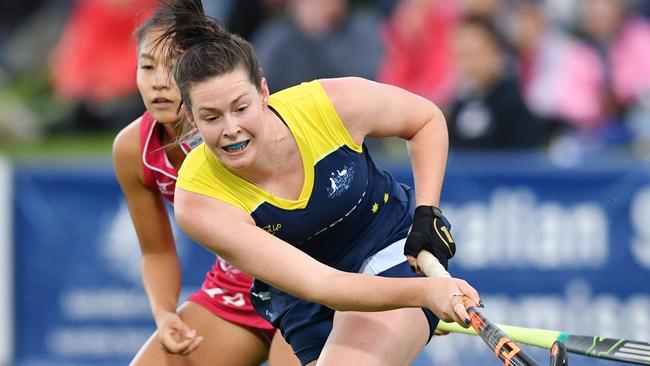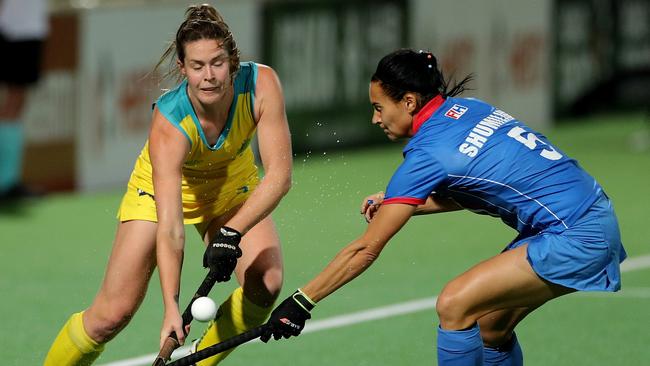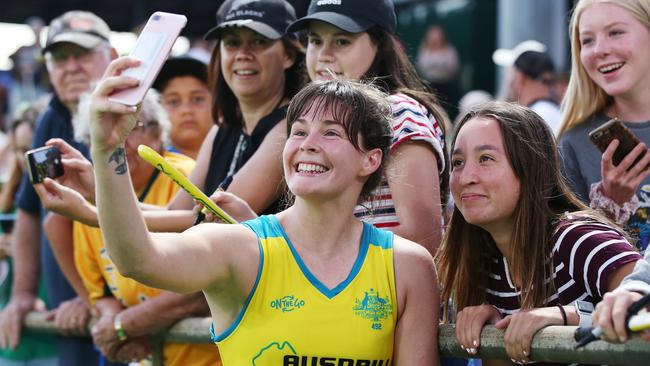Hockeyroo Lily Brazel starts legal battle with Hockey Australia over contract termination
Elite women’s hockey in Australia is in crisis, it has reached a point where the on-field success can no longer mimic the problems off field.

Women's sport
Don't miss out on the headlines from Women's sport. Followed categories will be added to My News.
One of Australia’s best female hockey players has begun legal action against the national federation, claiming she was kicked off the high-performance program because she asked for time off to deal with her mental health concerns and senior staff didn’t believe her cry for help was real.
Star midfielder Lily Brazel, 25, has lodged a discrimination claim with the Western Australian Equal Opportunity Commission discrimination board, alleging her contract was terminated by Hockey Australia when she requested a six-week break to deal with her mental health issues after the Tokyo Olympics were postponed because of the global pandemic.
Capped 52 times by the Hockeyroos, Brazel claims she was told by Hockey Australia staff that her request was rejected because she was mistaking legitimate mental health issues with unhappiness — even though she was never examined by a team psychologist while a national coach, who was granted leave on mental health grounds, allegedly told her the difference between their cases was: “I actually have a problem.”

Brazel said she received a letter from Hockey Australia three days later, saying: “Thank you for outlining your intention to leave the program”.
Brazel told The Daily Telegraph: “I was basically put in a position where I had to choose between looking after my mental health and my position in the team and consequently my Olympic dream and so I decided to prioritise my mental health.
“That meant that my contract wasn’t renewed and rolled over like the rest of the squad members for the end of 2020, it finished in August.”
Hockey Australia told The Daily Telegraph it cannot and would not comment on Brazel’s case.
Brazel said she was told that part of the reason her contract was terminated was because she had breached the rules when she asked for a break from the elite program but wanted to play club hockey to keep in physical shape.

She claims she was told she had to prove she was worthy of reinclusion but was then left off a training camp in November.
“The main reason I’m speaking up and the reason I sought legal action is because I want Hockey Australia to be accountable for their actions because they’re failing and damaging our country’s best players,” she said.
“We’re continually getting pushed out the door and I want my teammates and future Hockeyroos to have an environment they deserve and the success they deserve and they’re just not getting that.”
Brazel’s claims come at the same time Hockey Australia has launched an investigation into complaints from past and present players about the “toxic culture” within the women’s high-performance set up.
Three Hockeyroos captains have recently stepped down. One of them, Georgina Morgan, was last week dropped from the national squad. She has appealed against her shock omission, along with Rachael Lynch, who was also left off despite being rated the best goalkeeper in the world.

The Daily Telegraph has been told players have been warned their contracts will be ripped up if they go public and lift the lid on the litany of problems — including complaints of alleged bullying within the organisation.
The Daily Telegraph has seen several letters of complaint that were sent to Hockey Australia in 2017 and 2018 as well as more recent grievances, including threats to stage a mass strike unless an fully independent and transparent investigation is carried out.
“Senior players who try and stand up for what’s best for the playing group are often not liked by the staff who just want athletes who comply and are silent so they chew us up and kick us out,” Brazel said.
“What I’m worried about is Hockey Australia is saying this is an isolated incident because it’s not at all. My experience mirrors so much of what other players have experienced.
“Yes, it’s toxic, yes there’s a cultural issue but Hockey Australia keeps defending all that by speaking to the program’s success but players don’t even enjoy being there and they’re too scared to speak out.”




